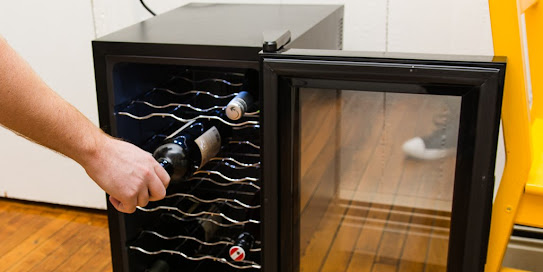Here are some things to consider when shopping for wine coolers
Wine coolers and small wine fridges are short-term storage units that are meant for relatively short periods. These coolers keep wine at the right temperature for consumption. This can vary depending on the wine. If you already have a wine cabinet or other permanent storage, a small wine cooler will work well to know more detail read Love Craft Wines blog. People buy wine as they need it and don't want to keep more than a dozen bottles.
The Basics of Cooler
The three main components of traditional cooling systems are the compressor, condenser, and evaporator. In the cold evaporator, the pressurized refrigerant expands to boil. Once the liquid becomes gas, heat (energy) can be absorbed. With the compressor refrigerant pumps, the gas is compressed to liquid again. The condenser then expels the heat from compression and heat absorbed by the evaporator into the air.
Thermoelectric Wine Fridges
Thermoelectric coolers are heat pumps, solid-state mechanisms that do not contain liquids, gases or moving parts. These devices benefit from the Peltier effect, which offers many benefits. Because there are no moving parts, the devices are simple to maintain. There are less things to replace in case of wear and tear. Thermoelectric coolers are therefore more reliable and last longer. They don't use refrigerants (CFCs) and are therefore better for the environment. The lightweight and streamlined design means that less space is required.
It is silent and does not vibrate due to the absence of moving parts.
Wine fridges with compressor
Compressor dependent coolers make the circulating refrigerant and compressor audible. Although this may seem like a minor problem, many wine fridge owners complain about the loudness of their units. It is better to have a compressor cooler built in, as it muffles the noise. However, thermoelectric coolers can be noisy because they use fans to circulate air. These fans are audible when they turn off and on. They can be quieter than a compressor.
Thermoelectric coolers use less energy and are more resistant to temperature fluctuations. They do not cycle on and off. It is also easier to control the temperature. Compressor-dependent coolers have a better cooling system and can be used in harsher environments. A compressor fridge is a must if you live in Las Vegas. The majority of wine coolers, regardless of type, are designed for mild environments. This means that most wine cooler owners will live in milder environments.
It is almost as important as choosing what wine cooler to buy. Bizrate, Epinions, Nextag and Nextag are great for finding bargains and reliable vendors. You could also purchase on well-known websites like Amazon, eBay, and Wine Enthusiast. Danby, Haier and Eurocave are some of the most well-respected wine cooler brands.
Haier's HVW18BSS wine refrigerator holds eighteen regular or Bordeaux-style bottles. Champagne, Chardonnay, and Pinot Noir lovers will find less. This wine cooler is designed to be as small as possible.
Cuisinart wine refrigerators come in a variety of sizes: 32, 16 and 16 bottles, 12 and 12 bottle, as well as eight, eight, and six-bottle designs. Four sizes of thermoelectric wine refrigerators from Koolatron are available: four-bottle wall mountable units, four-bottle and six-bottle designs. The Eurocave Petite Wine Cooler is a 12-inch wide cabinet that can hold ten bottles horizontally.
EdgeStar wine coolers can store 12 to 32 bottles. Most of the smaller models, i.e. Koldfront sells the majority of the smaller models (i.e., six to twenty-six bottles capacities). These wine fridges come in a range of prices, from $150 to $700. These models are affordable enough for wine lovers with lower incomes and who have smaller homes to store their wine.




Comments
Post a Comment